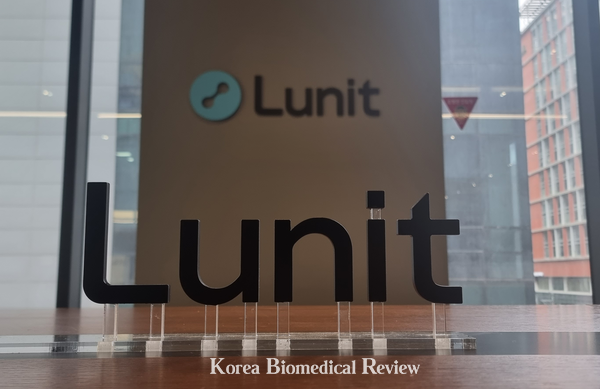Korean medical AI company Lunit posted first-quarter revenue of 19.2 billion won ($13.7 million), a 273.6 percent jump from the same period last year, fueled by rising demand for its AI-based cancer diagnostics and treatment tools overseas.
Despite the top-line growth, the company’s operating loss widened to 20.7 billion won, up 61.4 percent year over year, according to a Monday regulatory filing. Lunit booked a net profit of 2.03 billion won for the quarter, marking an 82.1 percent turnaround from a year-earlier loss, but said the gain stemmed from a one-off revaluation of convertible bonds.
International sales surged 327.1 percent to 17.9 billion won, making up 93 percent of total revenue. Domestic sales climbed 34.6 percent to 1.27 billion won.

Lunit and its New Zealand-based subsidiary Volpara Health reported record-high sales in cancer screening. Revenue from Lunit INSIGHT, the company’s AI diagnostic platform, rose 39 percent year over year, backed by a deal with Saudi Arabia’s largest private medical group, Dr. Sulaiman Al Habib, and increased direct sales in Singapore.
Revenue from Lunit SCOPE, its AI biomarker platform for cancer treatment, rose 135 percent, driven by new research contracts with global pharmaceutical companies.
Volpara, which Lunit acquired last year, posted a more than 10 percent increase in revenue to 11.72 billion won. Subscription-based software accounted for 98 percent of its sales, contributing what the company described as a stable and predictable income stream.
Lunit also launched INSIGHT DBT, an AI tool for analyzing 3D breast tomosynthesis images, through Volpara’s distribution network in North America. The rollout marked the first U.S. deployment of a Lunit product via the integrated sales channel.
“The first-quarter results show our global expansion strategy translating into tangible revenue growth,” said Lunit CEO Brandon Suh in a Monday note. “We aim to maintain balanced growth across diagnostics and therapeutics while deepening our presence in North America.”
Lunit also reaffirmed its long-term strategy, previously outlined at its March annual shareholders’ meeting, where Suh projected 2025 revenue of at least 80 billion won and ruled out a rights offering to fund operations.
The company is targeting profitability by 2027, banking on continued growth from its diagnostic platform INSIGHT and a ramp-up in its AI-powered pathology business, SCOPE, which is expected to deliver its first FDA-cleared companion diagnostic by that year.
Related articles
- Lunit signs AI cancer diagnostics supply deal with Germany’s largest radiology network
- SimonMed to roll out Lunit’s AI breast cancer detection software across 170 US centers
- Lunit to deploy AI imaging tools in Korean health screening clinics
- Lunit partners with US National Cancer Institute to bring AI biomarkers into cancer trials
- Lunit maps path to profitability by 2027, rules out rights offering
- Lunit secures AI mammography deal with SEHA in UAE's national screening program
- Lunit expands AI deal with Saudi hospital operator HMG to analyze 1 million chest X-rays
- Lunit receives approval for 3D breast tomosynthesis AI solution
- Lunit to unveil 12 AI-powered oncology studies at ASCO 2025
- Lunit's AI chest X-ray tool receives Europe's stricter CE MDR certification
- Lunit doubles H1 revenue on surging US sales, AI biomarker demand
- Volpara reaches break-even early as Lunit integration advances

